- MedVance Institute offers training to individuals who are planning today to be part of the medical profession tomorrow. To help meet the national demand for allied health professionals, MedVance is focused on offering its students a variety of medical programs.
School Highlights
Fortis Institute-Cookeville serves 452 students (100% of students are full-time).
The college's student:teacher ratio of 32:1 is higher than the state community college average of 18:1.
Minority enrollment is 12% of the student body (majority Hispanic and Black), which is less than the state average of 45%.
Quick Stats (2025)
- Enrollment: 452 students
- Private-state tuition: $13,715
- Acceptance Rate: 83%
- Student:teacher ratio: 32:1
- Minority enrollment: 12%
- Source: Integrated Postsecondary Education Data System (IPEDS)
School Overview
The teacher population of 14 teachers has stayed relatively flat over five years.
Fortis Institute-Cookeville
(TN) Community College Avg.
Carnegie Classification
Special Focus Two-Year: Health Professions
Not applicable, not in Carnegie universe (not accredited or nondegree-granting)
Institution Level
At least 2 but less than 4 years
At least 2 but less than 4 years
Institution Control
Private for-profit
Public
Total Faculty
14 staff
81 staff
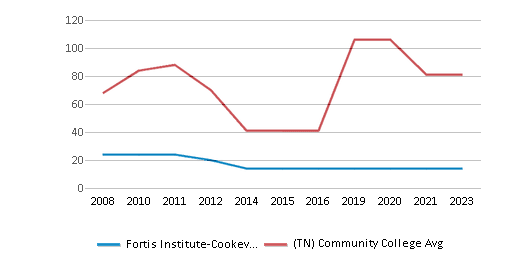
Student Body
The student population of Fortis Institute-Cookeville has grown by 111% over five years.
The student:teacher ratio of 32:1 has increased from 22:1 over five years.
The Fortis Institute-Cookeville diversity score of 0.22 is less than the state average of 0.65. The school's diversity has grown by 64% over five years.
Total Enrollment
452 students
605 students
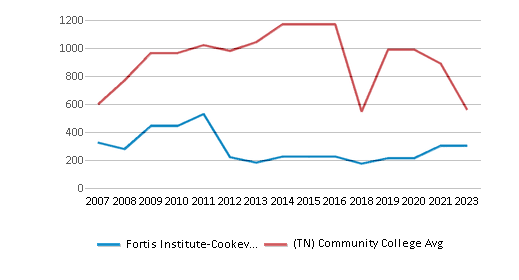
Student : Teacher Ratio
32:1
18:1
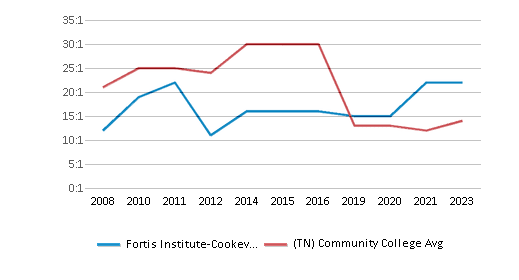
# Full-Time Students
452 students
400 students
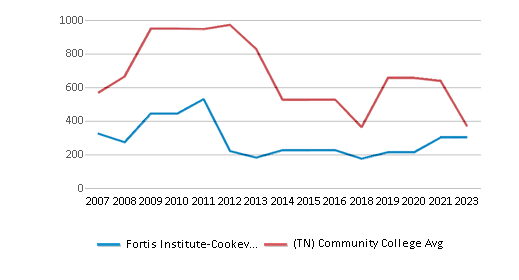
# Part-Time Students
n/a
230 students
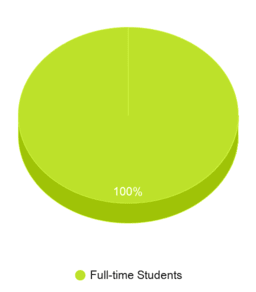
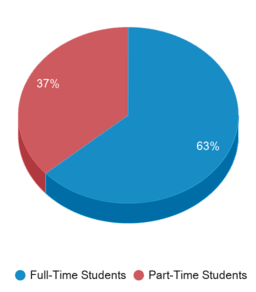
# Enrollment Undergraduate
452 students
504 students
# Full-Time Undergraduate Students
452 students
400 students
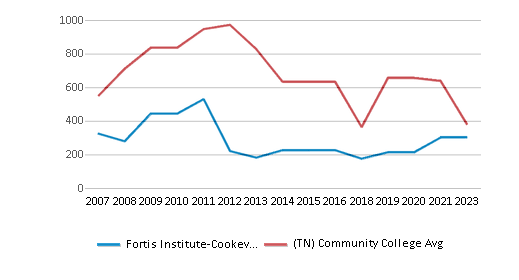
# Full-Time Graduate Students
n/a
12 students
# Part-Time Undergraduate Students
n/a
335 students
# Part-Time Graduate Students
n/a
12 students
Total Dormitory Capacity
n/a
195 students
% Asian
1%
4%
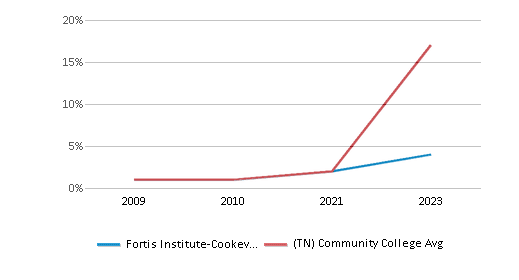
% Hispanic
4%
6%
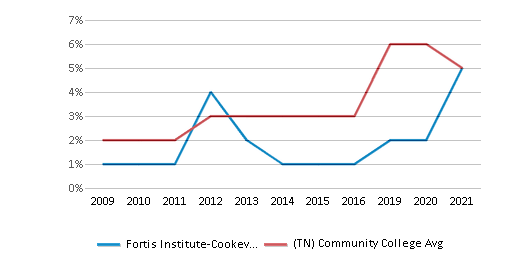
% Black
3%
19%
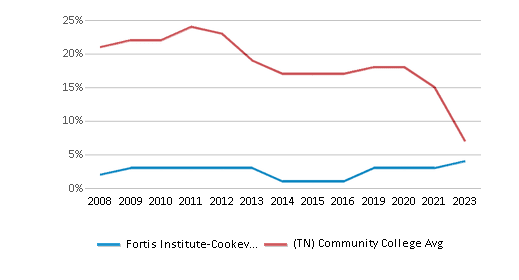
% White
88%
55%
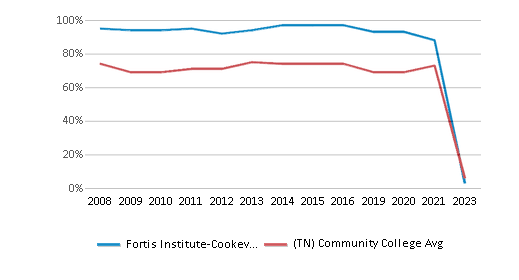
% Hawaiian
1%
9%
% Two or more races
2%
3%
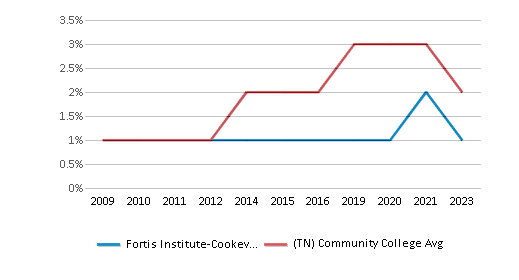
% Non Resident races
n/a
1%
% Unknown races
n/a
3%
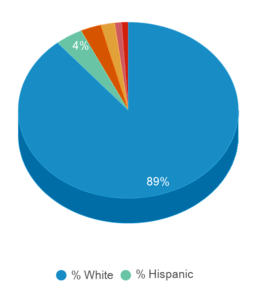
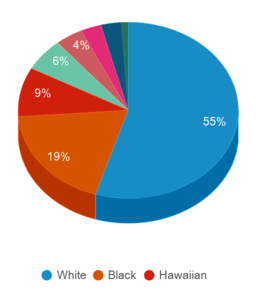
Diversity Score
0.22
0.65
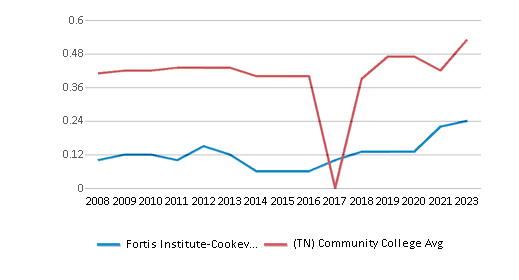
College Completion Rate (Students who graduate in less than 4 years)
0.4608%
0.6038%
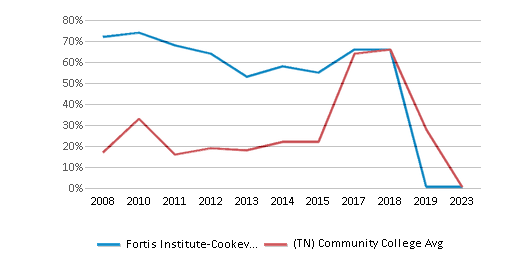
College Completion Rate (Students who graduate in 4 years or more than 4 years)
n/a
0.5213%
Average Graduate Earnings (10 Years)
$26,300
$29,000
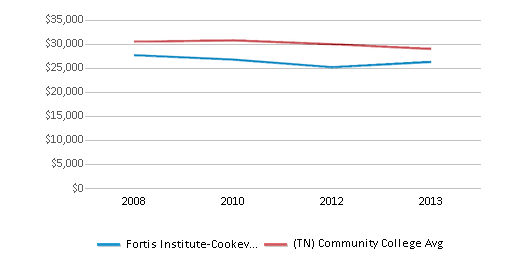
Tuition and Acceptance Rate
The private state tuition of $13,715 is more than the state average of $13,551. The private state tuition has declined by 10% over four years.
Private State Tuition Fees
$13,715
$13,551
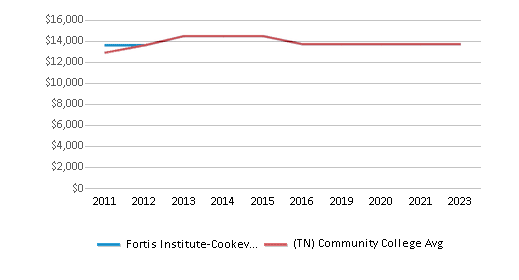
% Students Receiving Some Financial Aid
95%
97%
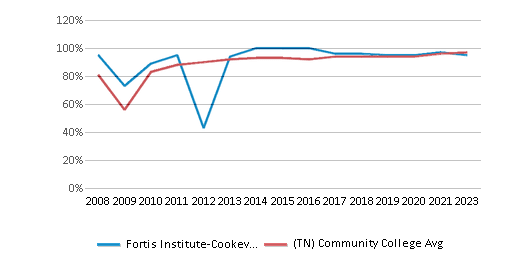
Median Debt for Graduates
$9,970
$10,500
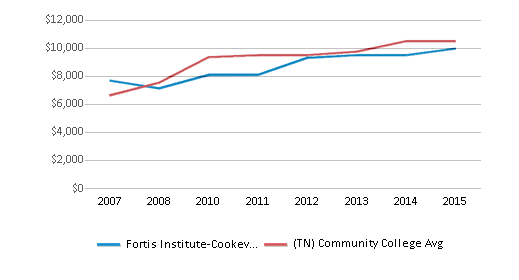
Median Debt for Dropouts
$6,194
$5,500
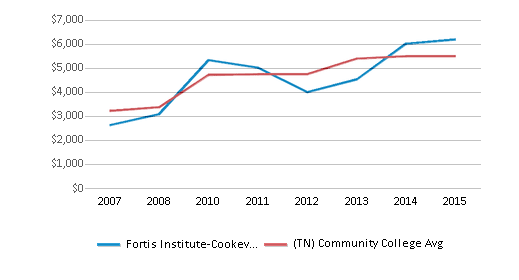
Acceptance Rate
83%
91%
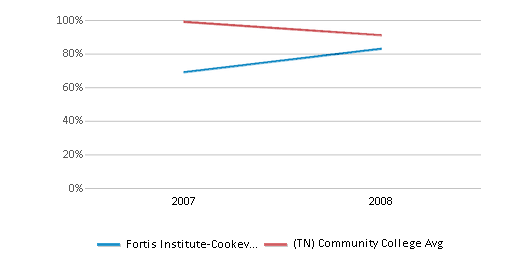
SAT Reading
n/a
415
SAT Math
n/a
455
SAT Writing
n/a
469
ACT Composite
n/a
20
ACT English
n/a
19
ACT Math
n/a
19
Source: 2023 (or latest year available) Integrated Postsecondary Education Data System (IPEDS)
School Notes
- MedVance Institute, formerly known as Cumberland School of Medical Technology, was established in June 1970 in Cookeville, Tennessee with a program of study for Medical Laboratory Technicians. The school was founded to provide career opportunities in the allied health professions. Graduates of the school are employed throughout the region and surrounding states in hospital laboratories, reference laboratories, medical businesses and industry. In May of 2000 KIMC Investments, L.P. acquired both campuses of Cumberland School of Technology. The school name was changed to MedVance Institute in July 2000 and two new programs, Medical Assistant and Medical Coding Specialist, were added to the curriculum. In 2001 Limited X-Ray, Patient Care Technician, Dental Assistant, Phlebotomy and Radiology Technology programs were added. In November 2001, The Florida Board of Education, Commission For Independent Education granted licensure for MedVance Institute to open a campus in Atlantis, Florida. The programs offered include Bio- Medical Electronics, Medical Laboratory Technology, Radiologic Technology, Dental Assisting, Medical Assisting, Medical Coding Specialist, Medical Office Administration, Patient Care Technician and Phlebotomy.On Jan 24, 2002 the Florida Commission approved additional new programs including Pharmacy Technician, Clinical Lab Assistant and the certificate program, Nursing Assistant. In March 2002, the Council of Occupational Education approved the Atlantis, Florida location of MedVance as an accredited branch of the main campus located in Cookeville, Tennessee. Medvance Institute offers Occupational Associate Degree program in Medical Laboratory Technology (18-Month Program) and Radiologic Technology (24-Month Program). Diploma programs includes Medical Assistant (9-Month Program), Medical Coding Specialist (12-Month Program), Medical Office Administration (9-Month Program), Pharmacy Technician (9-Month Program) and Surgical Technology (13-Month Program). The MedVance Institute campuses in Tennessee, Texas, Miami and Palm Springs, Florida are accredited by the Accrediting Commission of the Council on Occupational Education (COE).
Frequently Asked Questions
How much does Fortis Institute-Cookeville cost?
Fortis Institute-Cookeville's private state tuition is approximately $13,715.
What is the acceptance rate of Fortis Institute-Cookeville?
The acceptance rate of Fortis Institute-Cookeville is 83%, which is lower than the state average of 91%.
Recent Articles

Obtaining Your Bachelor's Degree at a Community College
Explore the evolving landscape of community colleges offering bachelor's degrees, addressing affordability, accessibility, and workforce needs.

A to Z of Community College Certificates and Courses
From business and healthcare to technology and skilled trades, the article showcases the breadth of options available to students seeking to enhance their knowledge, develop new skills, or pursue career advancement.

What is a Community College?
This comprehensive guide explains what a community college is, its history, and its role in higher education. It covers the types of programs offered, differences from four-year colleges, benefits of attending, and important considerations for prospective students, providing valuable insights for those exploring educational options.










